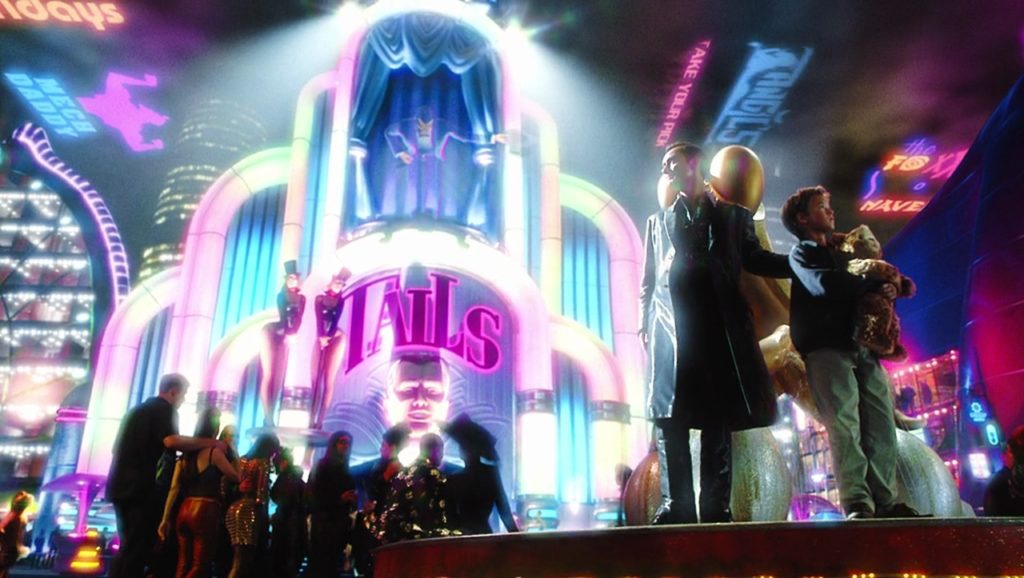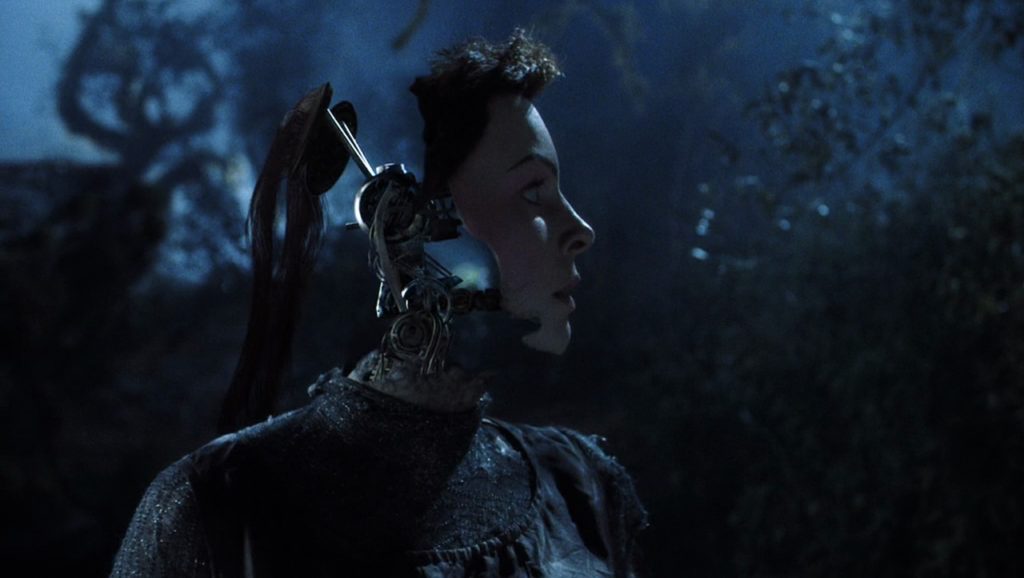| Ryan Sanderson |

A.I. Artificial Intelligence plays at the Trylon Cinema from Sunday, January 15 through Tuesday, January 17. Visit trylon.org for tickets and more information.
A lot of digital ink has been spilled over the origins of A.I. Artificial Intelligence, perhaps not so much recently (although this piece from the film’s twentieth anniversary does a good job compiling the relevant facts and anecdotes). Writer/director Steven Spielberg never tried to pawn it off as a straight-up Stanley Kubrick enterprise (it’s one of only three films in Spielberg’s career on which he takes both writing and directing credits, alongside his two most personal films, Close Encounters of the Third Kind and last year’s The Fabelmans), but it’s not purely a Spielberg film either. There’s a reverence that pushes it well outside his comfort zone.
An entertainer and businessman as savvy as Spielberg would only make these choices to fulfill the wish of his dying friend and mentor. That’s not to say A.I. is a bad film, or even a boring one. If you obsess over film language and technique, it’s one of the most fascinating movies ever made: one incredibly distinct filmmaker’s effort to translate the vision of another equally distinct (and incredibly different) filmmaker into his own personal language. And because of the prominence of both, it got a ninety-million-dollar budget. There will probably never be anything like it again.

When I first saw A.I. I was fifteen, a newly minted cinephile fresh off a Lord of the Rings obsession and speech class Hitchcock marathon (Shadow of a Doubt was the one that pushed things over the top). Eagerly I plumbed the internet for answers to that age-old question, “What’s good?,” mining Sight and Sound, the AFI, and various other online lists for the best films of all time. A.I. was divisive enough to not make most of those lists, but both of its big names were of course featured prominently. The only Kubrick I’d seen was (this is true) a fullscreen VHS copy of 2001: A Space Odyssey from the local library. On the other hand, I grew up in the nineties. Spielberg wasn’t just part of popular culture. In many ways, he was popular culture. The narrative, dynamic, and emotional fundamentals of Spielberg’s style informed what I expected every time I watched a movie. By this standard, A.I. profoundly disappointed me. For a while I even said it was the worst film I’d ever seen.
When I revisited the film years later, I was in the opposite camp. I believed there was a specifically Spielbergian kind of film and therefore also a Kubrickian one. The distinctions were hazy, but it was essentially the old art vs. commerce paradigm, and while I conceded there was some value to the Spielberg approach (how magnanimous), the Kubrick one was self-evidently superior. A.I. became my standard answer for favorite Spielberg film because its existential, metatextual aims aligned with what I considered Kubrick’s more lofty ambitions. I listed it alongside films like Rules of the Game and Andrei Rublev, which initially left me wanting but also curious. That curiosity led me to a more educated (I may have even said sophisticated) understanding of cinema as an art form and its ability to communicate.
Both of these takes were motivated by my own limited perspective on the world. I didn’t have exposure to a ton of pop culture as a child. My expectations were mostly shaped by Disney films and age-appropriate blockbusters. That left no room for A.I.’s metatextual layers and somber, momentum-killing final act. The second bias emerged from the first—desperate to transcend these limitations, I obsessed over the notion of cultural value and greatness, and artists (especially filmmakers) to whom such qualities were most commonly attributed. A.I. was great for precisely the reasons I previously thought it was terrible.

Revisiting the film this week, I shockingly find myself somewhere in the middle, closer to the actual object and therefore less able to make broad proclamations about it. I love its ambition, its darkness, the way it tells a Spielberg story within the larger context of Kubrick’s pessimistic vision of the universe. I love how cruelty and pity lie at the edges of the frames, how Spielberg stares directly into his mentor’s bleakness and still insists upon treating David (Haley Joel Osment, doing what he did in that era) sympathetically. I can’t imagine the scene where Gigolo Joe (Jude Law) tells David, “I am,” was in Kubrick’s treatment. For all his reverence, Spielberg will not concede the ultimate point—this is his film, and that means there’s something inherently noble to life, even to an obsessed robot child programmed to yearn after a distant mother in a post-apocalyptic universe.
At the same time, my fifteen-year-old take, however hyperbolic, wasn’t wrong. There is something a bit off about translating Kubrick’s evasive, nuanced intentions into the language of one of the most on-the-nose filmmakers in history. Kubrick never cared if the audience came along with him. He thought some ideas needed to be puzzled over to be felt fully. Sit with 2001: A Space Odyssey or Eyes Wide Shut and try to argue he’s wrong. Spielberg, on the other hand, will never leave his audience confused. It’s not pure commercialism any more than Kubrick (who often cashed in on his reputation as a film’s high artist and the mystery of his ideas) is pure artistry. Spielberg is a populist. He doesn’t want to go anywhere he can’t take a teenager from Iowa who’s only seen Star Wars and a handful of Disney films with him. He works in broad, commonly understood gestures, which is what A.I. is entirely comprised of, even as it attempts to push its audience to see David in themselves and their relationship with technology.
But the melding of these two approaches has to occasionally frustrate. Either you’re hoping for the overwhelming catharsis of E.T., like I was when I first saw it, in which case you will be quite disappointed, to put it mildly. Or, you want whatever the hell 2001 is, not a prototype shot almost indistinguishably from Minority Report, a project Spielberg delayed to shoot until after Kubrick died. Spielberg set Minority Report aside to film A.I. and, with the exception of a few neon flourishes, its future tech and Janusz Kaminski’s dreary, overexposed cinematography feel incredibly similar (and unlike anything else in the director’s oeuvre). One could imagine certain details from the already-prepped Minority Report were used to fill in gaps on A.I.‘s rapid turnaround. It’s uncanny, not quite right, like a robot slathered in human skin and made to behave like a young boy. And yet it remains an incredible vision of Spielberg as an artist, and, if not Kubrick, then certainly Spielberg’s idea of Kubrick. The final act which so upset me originally also left me in tears on this rewatch. So much of this film, which, as stated above, positions a Spielberg story inside a Kubrick universe, is about context, how perspective defines the human experience, how our gifts and curses are often the same things. That shift two thousand years into the future late in the film—a period of time which, given the status of human society, feels impossibly far away, and yet a mere blink in the grand cosmic scheme of time—is just one more way to reorient the audience towards a larger, and, I think, more empathetic take on the story of life in a cold, uncaring universe.
Edited by Olga Tchepikova-Treon
